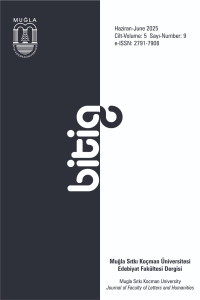Abstract
Bu makale, kapitalizm anlayışları ile Protestan etiği arasındaki bağlantıyı ortaya koymaktadır. Protestan etiği, kapitalizmin bugünkü halini almasında itici güç olmuştur. Protestanlık ve Katoliklik arasındaki siyasi ve dini farklılıklar, toplumun ve devletin gelişimini, yani ulusal ve devlet kimliğini etkilemektedir. Kapitalizm neden Kuzey Amerika ve Batı Avrupa'da gelişmiştir? Sosyolog Max Weber bu soruyu ortaya atmış, ancak cevabını da hemen vermiştir: Protestan ahlakı kapitalizmin ve rasyonalizmin gelişimi için ideal yatkınlıktadır. Bununla birlikte, inanç böyle bir politik-ekonomik sistemin temeli olarak düşünülebilir mi? Neden Katolikliğin değil de Protestanlığın kendisi kapitalizmin kalesidir? Güçlü kilise otoritelerine karşı isyan neden ortaya çıkmıştır? Bu makale, Weber'in öğretilerine dayanarak “Protestan etiği ve kapitalizm anlayışları” arasında daha fazla bağlantı kurmaya çalışacaktır. Yazarlar ayrıca, Protestan kilisesinin ana kollarından biri olan Kalvinizm'in adını aldığı ünlü Protestan papaz J. Calvin'i de analiz etmektedir. Sonuç bölümünde, nüfusun dinî kompozisyonu bağlamında Alman federal eyaletlerindeki ortalama GSYİH'nın mevcut verileri verilmiştir.
Thanks
Yazarlar, çeviri için gerekli izni veren Marko Šarić'e teşekkür eder.
References
- “Politički katolicizam”, (2016, Mart 1). Wikipedia içinde. https://hr.wikipedia.org/wiki/Politi%C4%8Dki_katolicizam#Katoli.C4.8Dki_pokreti_u_20._stolje.C4.87u
- 500 godina kalvinizma — kako je taj pokret utjecao na svijet?. (2010). Internetska biblioteka watchtower . https://wol.jw.org/hr/wol/d/r19/lp-c/2010647.
- Bundesamt für Statistik. (2016, Ağustos 26). Sprachen, Religionen – Daten, Indikatoren. http://www.bfs.admin.ch/bfs/portal/de/index/themen/01/05/blank/key/religionen.html.
- Conway, M. (1997). Catholic politics in Europe, 1918-1945, Routledge.
- Gehälter nach Bundesländern - Hier verdienen Sie am meisten. (2015, Mart 15). Finanzen. https://www.finanzen.net/nachricht/private-finanzen/gehaltsreport-2015-gehaelter-nach-bundeslaendern-hier-verdienen-sie-am-meisten-4209621.
- Jambrek, S. (1999). Hrvatski protestantski pokret XVI. i XVII. stoljeća, Matica Hrvatska.
- Jukić, J. (1995). Kršćanstvo i liberalizam. Društvena istraživanja, 4 (6 (20)), 885-910.
- Kaiser, W., & Wohnout, H. (Eds.). (2004). Political Catholicism in Europe 1918–45. vol I, Routledge.
- Kalvinizam. (2016, Haziran 1). Reformacija. https://reformacija.net/2010/02/11/kalvinizam/.
- King James Bible. (2007). King James Bible Online. https://www.kingjamesbibleonline.org/ (Orijinal çalışma 1611’de yayınlandı).
- Koja je razlika između katolika i protestanata?. (2016, Mart 2). Gotquestions. https://www.gotquestions.org/Hrvatski/razlike-katolici-protestanti.html.
- Matijević, Z. (ed.) (2002). Hrvatski katolički pokret - Zbornik radova s međunarodnog znanstvenog skupa održanog u Zagrebu i Krku od 29. do 31. ožujka 2001. g., Kršćanska sadašnjost, Zagreb.
- McGrath, A. E. (2007). Uvod u kršćansku teologiju. Teološki fakultet, Matija Vlačić Ilirik.
- Religionszugehörigkeit der Deutschen nach Bundesländern im Jahr 2011. (2015, Mayıs 18). Statista. https://de.statista.com/statistik/daten/studie/201622/umfrage/religionszugehoerigkeit-der-deutschen-nach-bundeslaendern/.
- Weber, M. (1968). Protestantska etika i duh kapitalizma. Veselin Masleša.
Abstract
The paper presents the connection between the conceptions of capitalism and the Protestant ethic. The Protestant ethic was the driving force for the formation of capitalism in its present form. Political and religious differences between Protestantism and Catholicism affect the development of society and the state, i.e. the national and the state identity. Why had capitalism developed in the North America and Western Europe? Sociologist Max Weber raised the question, but immediately gave the answer: the Protestant ethic was the ideal predisposition for the development of capitalism and rationalism. Nevertheless, could faith be considered as the basis of such a political-economic system? Why is Protestantism itself the stronghold of capitalism and not Catholicism? Why did rebellion against the powerful church authorities occur? This paper will try to establish more links between the “Protestant ethic and the conceptions of capitalism” based on Weber’s teachings. The authors also analyse the famous Protestant minister J. Calvin, after which one of the major branches in the Protestant church was named – Calvinism. In conclusion the current data of the average GDP in respective German federal states with the religious composition of the population are given.
References
- “Politički katolicizam”, (2016, Mart 1). Wikipedia içinde. https://hr.wikipedia.org/wiki/Politi%C4%8Dki_katolicizam#Katoli.C4.8Dki_pokreti_u_20._stolje.C4.87u
- 500 godina kalvinizma — kako je taj pokret utjecao na svijet?. (2010). Internetska biblioteka watchtower . https://wol.jw.org/hr/wol/d/r19/lp-c/2010647.
- Bundesamt für Statistik. (2016, Ağustos 26). Sprachen, Religionen – Daten, Indikatoren. http://www.bfs.admin.ch/bfs/portal/de/index/themen/01/05/blank/key/religionen.html.
- Conway, M. (1997). Catholic politics in Europe, 1918-1945, Routledge.
- Gehälter nach Bundesländern - Hier verdienen Sie am meisten. (2015, Mart 15). Finanzen. https://www.finanzen.net/nachricht/private-finanzen/gehaltsreport-2015-gehaelter-nach-bundeslaendern-hier-verdienen-sie-am-meisten-4209621.
- Jambrek, S. (1999). Hrvatski protestantski pokret XVI. i XVII. stoljeća, Matica Hrvatska.
- Jukić, J. (1995). Kršćanstvo i liberalizam. Društvena istraživanja, 4 (6 (20)), 885-910.
- Kaiser, W., & Wohnout, H. (Eds.). (2004). Political Catholicism in Europe 1918–45. vol I, Routledge.
- Kalvinizam. (2016, Haziran 1). Reformacija. https://reformacija.net/2010/02/11/kalvinizam/.
- King James Bible. (2007). King James Bible Online. https://www.kingjamesbibleonline.org/ (Orijinal çalışma 1611’de yayınlandı).
- Koja je razlika između katolika i protestanata?. (2016, Mart 2). Gotquestions. https://www.gotquestions.org/Hrvatski/razlike-katolici-protestanti.html.
- Matijević, Z. (ed.) (2002). Hrvatski katolički pokret - Zbornik radova s međunarodnog znanstvenog skupa održanog u Zagrebu i Krku od 29. do 31. ožujka 2001. g., Kršćanska sadašnjost, Zagreb.
- McGrath, A. E. (2007). Uvod u kršćansku teologiju. Teološki fakultet, Matija Vlačić Ilirik.
- Religionszugehörigkeit der Deutschen nach Bundesländern im Jahr 2011. (2015, Mayıs 18). Statista. https://de.statista.com/statistik/daten/studie/201622/umfrage/religionszugehoerigkeit-der-deutschen-nach-bundeslaendern/.
- Weber, M. (1968). Protestantska etika i duh kapitalizma. Veselin Masleša.
Details
| Primary Language | Turkish |
|---|---|
| Subjects | History of Religion, Early Modern European History |
| Journal Section | Translations |
| Translators |
Ana Reš
|
| Early Pub Date | June 26, 2025 |
| Publication Date | June 30, 2025 |
| Submission Date | February 9, 2025 |
| Acceptance Date | April 16, 2025 |
| Published in Issue | Year 2025 Volume: 5 Issue: 9 |
Cite
bitig Journal of Faculty of Letters is licensed under a  Creative Commons Attribution-NonCommercial-ShareAlike 4.0 International License.
Creative Commons Attribution-NonCommercial-ShareAlike 4.0 International License.


